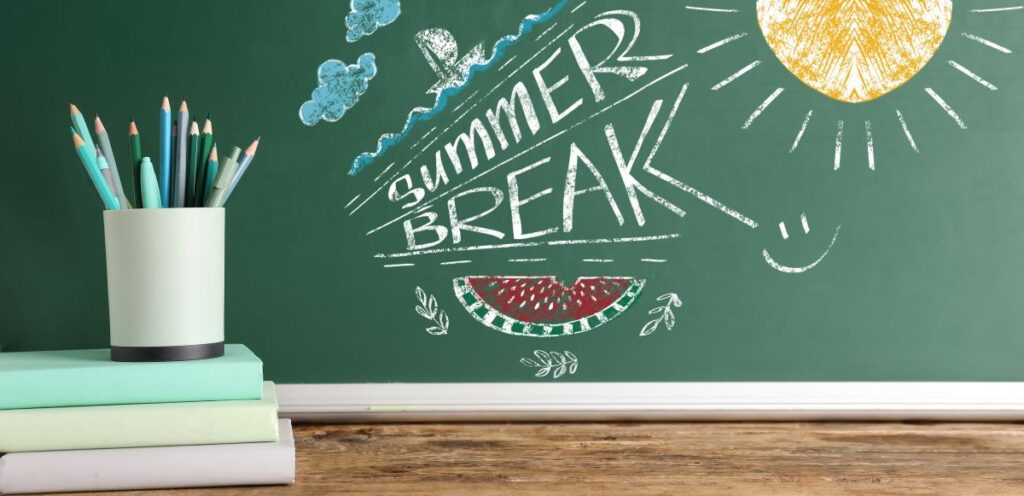As the school year winds down, most educators can finally breathe a sigh of relief. Summer break offers an opportunity to rest and recharge from a long year of lesson planning, grading papers, and managing students. While most teachers view this time as a much-needed respite, others choose to use this time to work on professional development or tackle their to-do list. Striking the right balance between work and relaxation is key to maintaining overall well-being. Here we’ll explore a few different strategies to help you enjoy your summer while also preparing for the next school year.
The Importance of Recharging
It’s essential to understand the importance of resting and recovering from a long school year. The school year is demanding and can take a physical and mental toll. Allow yourself time to unwind, be with your family, and do the things you love. Consider activities that promote relaxation such as yoga, reading, painting, or meditation.
Try physical activities to help to boost your mood and enhance your energy levels. Immerse yourself in hobbies you love or try using an app like Calm to help guide you through mindful meditation. Taking a break can help reduce stress and improve overall mental health.
Set Realistic Summer Work Goals
Planning for the upcoming school year is important but it should be done in moderation, so it won’t feel overwhelming. Try to establish work boundaries by setting realistic and manageable goals for the summer. For example, identify a few specific areas you want to focus on or refine such as classroom management, practical strategies, or incorporating new technologies.
Once you’ve identified these areas then you can divide these tasks into smaller, more manageable steps. This approach will make the workload less daunting and allow you to get some work done over the summer without feeling too overwhelmed. Just make sure you allocate specific days/times each week to get your work done so it won’t interfere with your summer plans or rest and recharge time.
Engage in Meaningful Professional Development
Professional development is vital for your growth and career development; however, it shouldn’t take over your entire summer break. This summer, engage in professional development activities mindfully. Choose opportunities that interest you and will have an impact on your teaching. Only attend a workshop or conference that aligns with these interests. For example, learning a new teaching method that utilizes technology or reading educational books that inspire you. Focusing on your specific interests or passions will make your experience more enjoyable and less like something you have to do for your career.
Learn to Say No
One of the biggest challenges many teachers face is learning to say no to any opportunity that may come their way. Whether it’s teaching a summer school class or attending a summer workshop, teachers often feel they can’t turn away from any request that may benefit their career. Learning to say no is a powerful skill that can help maintain your well-being. Remember, it’s okay to say no to any request or commitment you feel you don’t have the energy for. A well-rested teacher will be a more effective teacher than a burnt-out one.
Structured Time Management
To achieve a healthy balance, allocate specific periods for work tasks and separate times for personal and leisure activities. For example, you might decide to focus on curriculum planning every Monday and Wednesday morning for a few hours or read an educational book for fifteen minutes every night before you go to sleep. By structuring your schedule this way, you stay on track with professional goals, while ensuring you have plenty of time for self-care.
Welcome Flexibility and Change
While organized scheduling of your summer activities is important, it’s also equally important to stay flexible and adaptable. Summertime can be unpredictable, and your plans may change so if you find that you suddenly have a new commitment or a few minutes of downtime, you should allow yourself the grace to adjust your schedule as needed. Your goal is to create a balance that supports your overall well-being. If you find your plans are too ambitious or you realize you need a break, being flexible will ensure your summer break will be enjoyable and productive.
Build a Strong Support System
Connecting with colleagues over the summer is a great way to maintain a healthy summer work balance. Your colleagues understand the unique challenges and rewards of teaching. They may also share some of your summer goals and plans. Consider building a small supportive summer teacher community where you can meet to share resources and offer support. This supportive environment will keep you accountable and help you to stay on track.
Reflect and Set New Goals
Take time to reflect and set new goals for the upcoming year. You can do this by writing down what you think worked and didn’t work the previous school year. Jot down what you want to improve as well as any thoughts. Then choose some new specific goals you want for the next school year. This can be related to your teaching methods or work-life balance.
Finding a balance between summer work and relaxation is crucial for your overall well-being. By focusing on self-care, setting clear work boundaries, choosing meaningful professional development, and spending quality time doing the things you love, you can recharge and be ready for the new school year. Remember, a balanced summer benefits you and helps your students when you return refreshed and full of energy.
Educators never stop learning; check out our available graduate degree programs to hone your skills and promote lifelong learning and academic excellence.




